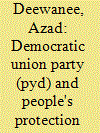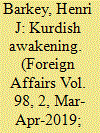|
|
|
Sort Order |
|
|
|
Items / Page
|
|
|
|
|
|
|
| Srl | Item |
| 1 |
ID:
183730


|
|
|
|
|
| Summary/Abstract |
This article explores the construction of the Syrian Kurdish Democratic Union Party (PYD) and the People's Protection Units (YPG) in Turkish official discourse. In the article, I employ critical discourse analysis (CDA) to analyze written texts produced during the years 2014–2019 that reflect the position of the Turkish authorities. The article sets out the main narratives that construct the PYD and YPG as terrorist organizations and posits them as a threat to both Turkey and the international community. The analysis reveals that these narratives serve the purpose of delegitimizing the PYD and YPG and legitimizing Turkish military operations and violations against Syrian Kurds. It highlights that the Turkish official position regarding the PYD and YPG is driven by two ideological factors: first, the influence of Kurdish autonomy in Syria on the action of Kurds in Turkey, and second, the barrier that the PYD and YPG have created against the Islamist agenda of Turkey's Justice and Development Party (AKP) in Syria.
|
|
|
|
|
|
|
|
|
|
|
|
|
|
|
|
| 2 |
ID:
163311


|
|
|
|
|
| Summary/Abstract |
We’ve been fighting for a long time in Syria,” said U.S. President Donald Trump in the last days of 2018. “Now it’s time for our troops to come back home.” The president’s surprise call for a rapid withdrawal of the nearly 2,000 U.S. troops stationed in Syria drew widespread criticism from members of the U.S. foreign policy establishment. But it came as an even greater shock to the United States’ main partner in the fight against the Islamic State (or ISIS), the Syrian Kurds. For weeks prior to the announcement, Turkish President Recep Tayyip Erdogan had been threatening to invade areas of northern Syria controlled by Kurdish militants. The only thing stopping him was the presence of U.S. troops. Removing them would leave the Kurds deeply exposed. “If [the Americans] will leave,” warned one Syrian Kurd, “we will curse them as traitors.”
|
|
|
|
|
|
|
|
|
|
|
|
|
|
|
|
| 3 |
ID:
183372


|
|
|
|
|
| Summary/Abstract |
From Syria’s independence to the eve of the civil war in 2011, Kurds in Syria were subjected to state ethno-exclusion, economic and socio-political marginalization, impacting on their freedom and profoundly altering the demography of their region. The majority became stateless and sank into severe poverty, having to work illegally on their own land and participate in informal cross-border trade for their basic needs. This article examines this cross-border trade and its impact on interaction between Kurds in Syria and those in Turkey, arguing that it has not only been a socio-economic resource for marginalized Syrian Kurds but that these interactions have contributed to a broader social process of Kurdish political mobilization, which resulted in socio-political trajectories that became evident just before Syria’s civil war.
|
|
|
|
|
|
|
|
|
|
|
|
|
|
|
|
| 4 |
ID:
142155


|
|
|
|
|
| Summary/Abstract |
Historically the role of the Kurds and Kurdish parties in Syria has been shaped by the Syrian government's regional power politics. Within Syria, the status of the Kurdish population ranges from being tolerated to being actively oppressed. At the same time, the Syrian government used the Kurdistan Workers' Party (PKK) as a proxy to wage war in response to Turkey's “water-dam politics” that left Syria vulnerable to droughts. Within this complicated and ever-changing power landscape, the Kurds and the PKK had to adapt their aims and strategies.1 However, with the loosening grip of the Assad regime in 2011, the situation changed, and Syria's Kurds were able to take control of the Kurdish-majority areas. In particular, parties affiliated with the PKK were able to make the most of the situation. In late 2014, the Kurdish-controlled areas, with the exception of the besieged town of Kobane, are some of the few parts of Syria that show relative stability.2 Apart from being an effective force against the jihadists of the Islamic State (IS), the Kurdish-led autonomous government is also the only one offering a political alternative to the repressive Assad regime and the violent Islamic State.
|
|
|
|
|
|
|
|
|
|
|
|
|
|
|
|
| 5 |
ID:
138612


|
|
|
|
|
| Summary/Abstract |
In the first weeks of October this year, an array of tanks waited on Turkey’s southern border, their commanders watching carefully as the Islamic State of Iraq and al-Sham (ISIS) fought to capture the nearby Syrian–Kurdish town of Kobane. The Democratic Union Party (PYD), the force defending the town and an offshoot of Turkish insurgent group the Kurdistan Workers’
Party (PKK), sought help from the powers allied against ISIS: the European Union, NATO, the United Nations, Turkey and, above all, the United States. But Ankara was reluctant to directly intervene in Kobane; it refused to allow help to reach the defenders and denied Washington permission to fly offensive operations out of the US Air Force base at Incirlik, in southern Turkey. Despite the threat that ISIS posed to the country further down the line, Ankara’s preference appeared to be for the town to fall, thereby dealing a heavy blow to the Syrian Kurds.
|
|
|
|
|
|
|
|
|
|
|
|
|
|
|
|
|
|
|
|
|